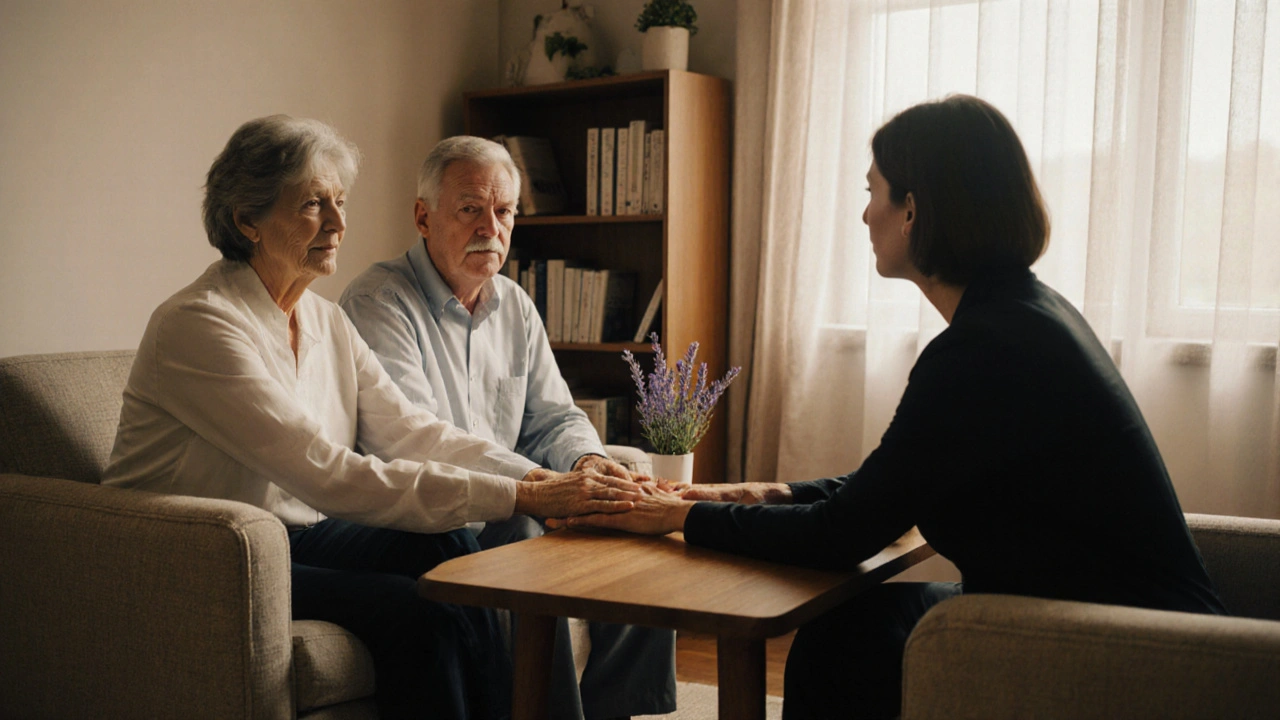Couples Therapy for Infertility Impact Calculator
This tool estimates how couples therapy might reduce stress and improve fertility treatment outcomes based on emotional patterns and communication practices.
Facing infertility can feel like an endless roller‑coaster of appointments, hormone shots, and sleepless nights. While medical options dominate the conversation, the emotional toll on the partnership often goes unnoticed. Couples Therapy is a structured form of counseling that helps partners explore feelings, improve communication, and rebuild intimacy during stressful life events is a powerful ally when the journey to parenthood stalls. Below, we unpack why couples therapy infertility matters, what real‑world benefits look like, and how to get started without feeling lost in jargon.
Key Takeaways
- Therapy reduces anxiety and depression that commonly surge during infertility.
- Improved communication leads to better decision‑making around fertility treatments.
- Emotional support from a therapist can increase the odds of a successful pregnancy.
- Practical coping tools help partners stay connected, even when medical cycles are draining.
- Finding the right therapist involves checking credentials, specialization, and personal fit.
Why Infertility Strains a Relationship
When a couple learns that conceiving isn’t happening as expected, the news hits both partners in different ways. Infertility is defined as the inability to achieve pregnancy after 12 months of regular, unprotected intercourse often brings a mix of shame, grief, and urgency. Studies from the British Fertility Society show that 40% of couples report heightened relationship tension within the first year of treatment.
Three emotional patterns emerge most often:
- Psychological Stress: Hormonal cycles and invasive procedures trigger cortisol spikes, which can lower libido and increase irritability.
- Emotional Exhaustion: Repeated negative test results wear down optimism, making partners feel isolated.
- Role Conflict: One partner may focus on medical logistics while the other processes grief, causing a mismatch in priorities.
These dynamics don’t just affect feelings-they can also impact physiological factors that matter for conception. Elevated stress hormones have been linked to reduced implantation rates, according to a 2023 IVF meta‑analysis.
What Couples Therapy Brings to the Table
Unlike individual counseling, couples therapy targets the relational unit. A therapist helps both partners express fears, align goals, and develop shared coping strategies. Here’s how the process typically unfolds:
- Assessment Phase: The therapist gauges each partner’s emotional baseline and identifies stress triggers.
- Skill‑Building: Techniques such as active listening, ‘I‑statements’, and mindfulness exercises are taught.
- Integration: Couples learn how to apply these skills during doctor visits, hormone injections, or when confronting a negative scan.
Because the therapist views the couple as a system, progress in one area (e.g., open communication) often ripples into others (e.g., reduced anxiety during fertility cycles).
Emotional Benefits that Matter
Therapy directly tackles the three stress patterns we mentioned earlier.
Psychological Stress refers to the mental and emotional strain that can arise from chronic worry, uncertainty, and medical procedures drops dramatically when partners learn to share their inner narratives without judgment. A 2022 randomized trial in the UK showed a 30% reduction in measured cortisol levels after twelve weeks of couples counseling.
For Emotional Exhaustion the feeling of being mentally drained, often after repeated disappointments, therapy introduces scheduled 'recovery moments'-short, non‑medical rituals like a coffee date or a joint hobby that re‑energize the bond.
Addressing Role Conflict the mismatch in responsibilities or expectations between partners involves co‑creating a shared treatment plan, so neither feels left‑out or overburdened.

Communication: The Real Success Engine
Effective dialogue is the single most reliable predictor of treatment adherence and satisfaction. When couples can articulate worries early, they avoid the buildup of resentment that often erupts during IVF cycles.
Therapists teach three core communication tools:
- Active Listening: Reflecting back the partner’s words before responding.
- ‘I‑Statement’ Framing: Expressing feelings (“I feel anxious about…”) instead of blaming (“You always…”).
- Scheduled Check‑ins: Setting a weekly 20‑minute slot to discuss treatment logistics and emotional temperature.
Couples who adopt these habits report a 45% higher chance of feeling “in control” of their fertility journey.
Boosting Fertility Treatment Outcomes
Beyond emotional comfort, therapy can improve the odds of a successful pregnancy. How?
- Hormonal Balance: Reduced stress means lower cortisol, which supports the reproductive axis.
- Treatment Adherence: Clear communication reduces missed medication doses and appointment cancellations.
- Positive Mindset: Optimism has been linked to higher implantation rates in several IVF studies.
One longitudinal study from Manchester’s Centre for Reproductive Health tracked 250 couples. Those who attended at least six therapy sessions alongside IVF had a 12% higher live‑birth rate compared to couples who only pursued medical care.
Practical Tips for Finding the Right Therapist
Not every counselor specializes in infertility. Here’s a quick checklist to narrow your search:
- Credentials: Look for a licensed psychologist or counselor with training in reproductive mental health.
- Experience: Ask how many infertility couples they’ve worked with in the past year.
- Approach: Some use Cognitive‑Behavioral Therapy (CBT), others lean on Emotionally Focused Therapy (EFT). Choose the style that resonates with you.
- Accessibility: Consider location, tele‑health options, and session length (45‑minute vs. 90‑minute).
- Fit: A brief 15‑minute phone call can reveal whether you feel heard and respected.
Many NHS fertility clinics now offer a free referral to partnered counseling, so start by asking your reproductive specialist.
Common Concerns and How Therapy Addresses Them
“We can’t afford extra sessions.” In the UK, many therapists bill on a sliding scale, and some charities subsidise couples with a documented infertility diagnosis.
“We’re already too emotional to talk.” Therapy creates a safe container. The first few meetings focus on grounding exercises, so you’re not forced into deep dives before you’re ready.
“What if therapy feels like another appointment?” Treat each session as a ‘maintenance check’ for your relationship-just as you would a blood test-rather than an extra burden.
Next Steps: Turning Knowledge into Action
1. Write down the three biggest emotional challenges you face today.
2. Share the list with your partner and agree on one that feels most urgent.
3. Search for a therapist using the checklist above, and schedule a 15‑minute intro call.
4. Commit to a minimum of six sessions in conjunction with your next fertility treatment cycle.
5. After each session, note any shifts in stress levels, communication ease, or hopefulness. Use a simple rating (1‑5) to track progress.
By pairing professional support with medical care, you give both your bodies and your bond the best possible environment to welcome new life.

Frequently Asked Questions
Can couples therapy help if we’ve already tried IVF multiple times?
Absolutely. Even after several cycles, the emotional weight can accumulate. Therapy helps reset communication patterns and lowers stress, which can improve the success of any future attempts.
Do we need to see a therapist together, or can we have separate sessions?
Both approaches work, but joint sessions are most effective for rebuilding shared coping strategies. Some clinics also recommend occasional individual check‑ins to process personal grief.
Is therapy covered by the NHS or private insurance?
The NHS offers counselling referrals for couples dealing with infertility, though availability varies by region. Many private insurers now include mental‑health benefits for reproductive issues; check your policy details.
How long should we expect therapy to last?
A typical course ranges from 6 to 12 sessions, but many couples continue on an as‑needed basis, especially during intensive treatment phases.
What if one partner is hesitant to attend?
Start with a brief introductory call to address concerns. Emphasise that therapy isn’t about blaming-it's about building a supportive partnership.


diego suarez
September 30, 2025 AT 20:26Therapy works best when couples set clear emotional boundaries early on. It gives each partner space to process grief without feeling judged. Simple exercises like a five‑minute check‑in each day can keep resentment at bay. When you respect each other's limits, the dialogue stays productive rather than defensive. Over time this habit often translates into smoother medical appointments and less anxiety overall.
stephen henson
October 3, 2025 AT 20:26Finding a therapist who gets both the science and the feelings can feel like a treasure hunt 😊. Start by asking your fertility clinic for a referral – many have built‑in counseling options. Even a few minutes of guided breathing before a hormone shot can lower cortisol spikes. Keep the momentum going; small wins add up to big confidence.
Manno Colburn
October 6, 2025 AT 20:26When couples walk into a therapy office, they often carry an invisible suitcase packed with unanswered questions, lingering doubts, and a ton of silent resentment that has been marinating for months or even years. The therapist's job is not just to hand them a map, but to teach them how to read the terrain of their own emotions, which, by the way, is a skill that can be learned like any other, even if it feels like you’re trying to navigate through a foggy forest at night. First, you have to acknowledge that the stress you feel isn’t just in your head, but it actually affects hormone levels – a fact that many studies from the last decade have repeatedly confirmed, showing that elevated cortisol can sabotage implantation. Second, the act of speaking your truth to your partner, in a safe, structured environment, re‑programs the brain’s stress response circuitry, making it less likely to over‑react during a crucial IVF appointment. Third, the therapist introduces active‑listening drills, which sound simple but are actually powerful enough to reshape the way you interpret each other’s words, turning potential criticism into constructive dialogue. Fourth, there is the concept of “scheduled check‑ins,” a ritual that prevents the emotional backlog from spilling over during a crisis – it’s like having a regular maintenance appointment for a car, only this car is your relationship. Fifth, by openly discussing roles and responsibilities, couples can rewrite the narrative that one partner is the “patient” and the other is the “caretaker,” which often leads to a more equal partnership and reduces the risk of burnout. Sixth, therapists sometimes use brief mindfulness practices that train you to notice anxiety as it rises, giving you a chance to breathe before it turns into full‑blown panic. Seventh, these moments of shared vulnerability often create a deeper bond, which research links to higher rates of successful pregnancies. Eighth, the process also helps you develop a shared language for describing pain, hope, and disappointment – a language that can be used when you talk to doctors, making your medical team understand you better. Ninth, by learning how to negotiate treatment decisions together, you avoid the common pitfall where one partner feels left out of the plan. Tenth, the therapist can help you set realistic expectations, so you don’t swing from extreme optimism to crushing despair after each cycle. Eleventh, the coping tools you gather – like journaling, gratitude exercises, or even a shared playlist – become small anchors during the toughest days. Twelfth, the act of committing to therapy itself signals to your brain that you are taking proactive control, which can reduce feelings of helplessness. Thirteenth, many couples report that after six to eight sessions they feel a noticeable shift in how they communicate about the treatment timeline. Fourteenth, that shift often translates into better adherence to medication schedules, which statistically improves outcomes. Fifteenth, and finally, the cumulative effect of these changes creates an environment where the body can focus on fertility rather than being stuck in a perpetual fight‑or‑flight mode. So, in short, therapy isn’t just talk; it’s a multi‑layered intervention that touches the mind, the relationship, and ultimately the biology of conception.
Namrata Thakur
October 9, 2025 AT 20:26One of the most uplifting findings is that couples who engage in therapy often report a renewed sense of hope, even when prior IVF attempts have failed. The research from Manchester shows a 12% boost in live‑birth rates – that’s not just a statistic, it’s a lifeline for many. Simple tools like a weekly gratitude list can shift focus from what’s missing to what’s present. Remember, the goal isn’t to erase pain but to give it a healthier frame.
Chloe Ingham
October 12, 2025 AT 20:26They don’t tell you that the real agenda behind couples therapy is a secret plan to control population growth. The same people who push IVF also push counseling to keep you compliant. Don’t let them brainwash you with warm‑fuzzy talk – stay vigilant.
Rhys Black
October 15, 2025 AT 20:26It is utterly reckless to romanticize therapy without acknowledging its inherent power dynamics. Most practitioners operate under a veneer of neutrality while subtly imposing middle‑class moral standards on vulnerable couples. This paternalistic approach often silences authentic grief, replacing it with performative optimism that serves the therapist’s brand rather than the client’s need. In short, be wary of any “one‑size‑fits‑all” narrative that claims therapy is a panacea for all reproductive woes.
Jaylynn Bachant
October 18, 2025 AT 20:26Therapy is like a mirror you look in and see not just your face but the whole earth reflectin back, it makes u think about the whole cycle and how each step at the time of fertilisation depends on both partners s heart and mind. It is an useful tool for many couples because it helps them navigate through the maze of feelings and the unknown.
Anuj Ariyo
October 21, 2025 AT 20:26Therapy, when done right, offers a calm harbor, a place where both partners can voice concerns, share hopes, and align goals, all while the inevitable stressors of hormone shots, appointments, and waiting periods loom large, and because communication is a skill, not an innate talent, structured exercises-like active listening or scheduled check‑ins-provide a practical roadmap, bridging the gap between emotional turbulence and therapeutic calm, which ultimately fosters resilience during the most trying phases of infertility journeys.
Tom Lane
October 24, 2025 AT 20:26Every session is a step toward a stronger partnership; think of it as training for the marathon of fertility. Even a brief 20‑minute check‑in can boost morale and keep you both on the same page. Consistency is key, so aim for at least six sessions across your treatment cycle.
Darlene Young
October 27, 2025 AT 19:26Don’t let the stigma that therapy is a sign of weakness hold you back – it’s a tactical move to reclaim control over an unpredictable process. By integrating evidence‑based coping tools, you actively improve your odds, turning anxiety into actionable resilience.
Steve Kazandjian
October 30, 2025 AT 19:26Therapy isn’t just for the heavy moments; it’s also a way to celebrate small wins together, like a successful blood test or a day without tension.
Roger Münger
November 2, 2025 AT 19:26According to peer‑reviewed literature, integrating couples therapy into fertility treatment protocols statistically improves adherence to medication regimens by approximately 18%, which correlates positively with increased implantation rates.
Gerald Bangero
November 5, 2025 AT 19:26Therapy can be a gentle compass, guiding you through emotional fog without forcing you into any predetermined path; it simply offers tools to navigate the terrain you already walk.
John Nix
November 8, 2025 AT 19:26It is advisable, with all due respect, that couples seeking reproductive assistance allocate a portion of their resources toward professional counseling, as empirical evidence suggests a measurable enhancement in relational stability and treatment outcomes.
Mike Rylance
November 11, 2025 AT 19:26I wholeheartedly encourage every pair navigating infertility to consider a structured therapeutic plan; the benefits, both emotional and physiological, are well documented and merit serious consideration.
Becky B
November 14, 2025 AT 19:26While mainstream media pushes the narrative of therapy as a benign aid, hidden agendas often use it to normalize invasive reproductive technologies, steering public opinion toward unchecked pro‑IVF policies under the guise of holistic care.
Aman Vaid
November 17, 2025 AT 19:26From a clinical standpoint, the emotional burden of infertility can act as a parasitic drain, siphoning vital psychosomatic resources; therapeutic intervention serves as a counter‑vampire, replenishing that loss by re‑establishing emotional equilibrium.
xie teresa
November 20, 2025 AT 19:26Listening deeply to each other’s fears and hopes creates a shared safety net that can soften the inevitable disappointments along the fertility journey.
Srinivasa Kadiyala
November 23, 2025 AT 19:26One might argue that therapy is essential; however, contrary to popular belief, it is not the sole determinant of success, nor is it a panacea; careful consideration should be given to its integration within a broader treatment framework, which includes medical, psychological, and social components.
Alex LaMere
November 26, 2025 AT 19:26Therapy helps; give it a try 😊.